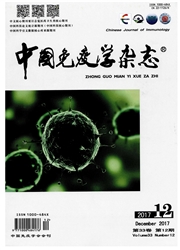

 中文摘要:
中文摘要:
目的:克隆并表达椰子花粉中泛变应原肌动蛋白抑制蛋白(Profilin)。方法:利用RT-PCR结合RACE技术克隆椰子花粉中泛变应原profilin的全长基因,并进行序列分析。然后设计带有酶切位点的特异性引物,采用RT-PCR获得整个椰子花粉profdin的开放阅读框,将其与pET28a载体连接并转化大肠杆菌BL21(DE3)进行诱导表达,通过Ni^2+亲和层析柱对重组蛋白进行纯化,采用Western blot检测其IgE结合活性。结果:克隆获得了椰子花粉profilin的全长基因,由608个碱基组成,开放阅读框为396个碱基(包括终止密码子),编码131个氨基酸。经分析,这个序列编码的蛋白为小分子量酸性蛋白,等电点为4.61,分子量约为14kD。此序列已被GeneBank收录,登陆号为EF173598。重组椰子花粉profilin在大肠杆菌中高效的表达和纯化后,经Westem blot检测具有良好的免疫学活性。结论:成功地克隆和表达了椰子花粉profilin,为该花粉profilin用于椰子花粉过敏诊断和免疫治疗提供了理论依据。
 英文摘要:
英文摘要:
Objective: To clone and express panallergen profilin from the pollen of coco ( Cocos nucifera Linnaeus ). Methods: RT-PCR and RACE methods were applied to clone the full-length panallergen genes from coco pollen and the sequence was analyzed. The specific primers were designed. The ORF of profilin of coco pollen was amplified with RT-PCR and cloned into the expression vector pET 28a. Expression of the recombinant coco pollen profilin was carried out in E. coli BL21 (DE3) and the purification of the recombinant protein was performed via affinity chromatography with Ni^2+ coupled to sepharose. IgE reactivity to recombinant coco pollen profilin was investigated by immunoblot. Results:The complete sequence of coco pollen profilin was cloned. The sequence was 608 bp and included an open reading frame (396 bp) coding for 131 amino acids. Sequence analysis showed that the deduced protein was an acidic protein with an estimated molecular mass of 14.19 kD and a pI of 4.61. The GeneBank accession number of the clones was EF173598. After overexpressed in E. coli BI21 (DE3), the recombinant protein was purified through affinity chromatography with Ni^2+ coupled to sepharose. Immunoassay showed that the recombinant allergen has good IgE binding capacity. Condusion: The profilin of coco pollen is expressed successfully in BL21 (DE3), which will be used as a base for further study on coco pollen related allergy.
 同期刊论文项目
同期刊论文项目
 同项目期刊论文
同项目期刊论文
 期刊信息
期刊信息
